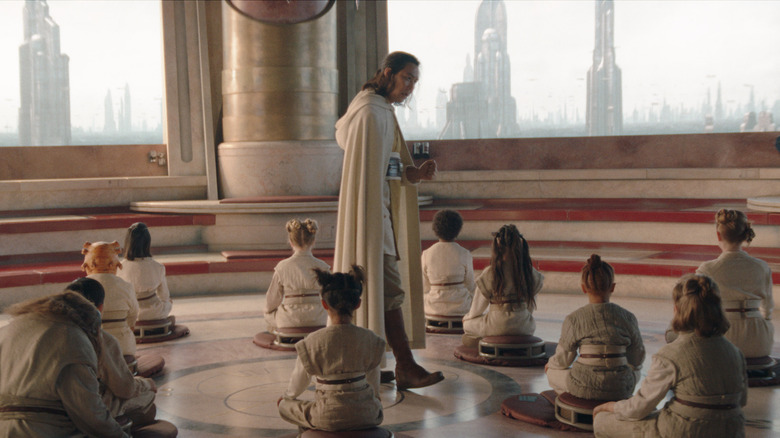Star Wars: The Acolyte's Brain Parasite Exposes Something Scary About Jedi
This article contains spoilers for "The Acolyte" Episodes 1 and 2
Ask most casual "Star Wars" fans, and they'll tell you that the Jedi are good guys. They're the keepers of the peace — the guardians of the galaxy, if you will. And though their spiritual dogma occasionally slips into obsessive territory, they champion the light above all else. In a world where darkness and evil are tangible forces, how could the Jedi be anything but heroes?
Dig a little deeper, though, and the answer to that question starts to get messy. The "Star Wars" prequels in particular paint a far more complicated view of the Jedi — a religious order that takes children from their families, rejects all emotional attachments, and blindly follows the will of the state more often than not, sometimes to the point of open war. "Star Wars: The Acolyte" shows the Jedi at what's supposed to be a peak moment for the order during the High Republic — the era preceding "The Phantom Menace." And yet, the new Disney+ series opens with its own tainted picture of the Jedi.
After former Jedi Osha (Amandla Stenberg) is arrested by members of the order for a murder committed by her twin sister Osha, she's put on a prisoner transfer ship bound for Coruscant. While onboard, she sees another prisoner who's been incapacitated by a parasite attached to his mouth. This mind-altering creature is apparently a pretty standard tool in the Jedi's law enforcement activities, which is unsettling to say the least.
The Star Wars parasite in The Acolyte Episode 1 - the dybbuk explained
Osha notices the afflicted prisoner soon after being locked up on the ship. Two other supposed crooks explain that the parasite is used to subdue "violent criminals" by doing "weird stuff to your brain." Whatever that means, it doesn't look like a terribly pleasant experience based on the prisoner's unnerving contortions.
The name that the prisoner calls the parasite sounds like "dybbuk," which is also the word for a kind of parasitic spirit in Jewish folklore. That would make some sense as an allusion, given the nature of the creature. When Osha pries the parasite off of the prisoner later in the episode, it flies away quickly, exhibiting a frightening amount of speed.
This is the first time that this creature has appeared in "Star Wars," but there have been several similar beasties in the past. In "Star Wars: The Clone Wars" Season 2, for instance, there's a series of episodes involving a unique species of Geonosian brain worm that can take over the minds of its hosts. You'd think that in a world where starships and laser guns are a dime a dozen, you could just administer a sedative to particularly violent or dangerous prisoners. Using such a visceral method of subjugation feels unnecessary, but it also isn't that out of character for the Jedi, unfortunately.
The Acolyte's brain parasite exposes something horrible about the Jedi
Let's not beat around the bush: Using a brain parasite to subdue prisoners through some sort of mental torment is essentially torture. This is also presumably being done before the man in question has received a trial, as he's on his way to Coruscant, the same as Osha. When the Jedi Knight Yord (Charlie Barnett) arrives to arrest Osha, he threatens the Trade Federation representatives present and generally throws his weight around. This is all pretty concerning — a picture of the Jedi as corrupt cops rather than wise monks — but it also isn't anything new.
The "Star Wars" universe is filled with examples of the Jedi abusing their power. In "The Clone Wars," several masters use a form of torturous mind reading to extract information from the bounty hunter Cad Bane. In "Tales of the Jedi," we see that Count Dooku lost faith in the order due to its continued loyalty to a corrupt senate. More often than not, the Jedi seem to believe that their allegiance to the light side justifies their actions, but it should really be the opposite. A rank and title don't make corrupt actions okay. Rather, you mark yourself as an agent of good by your consistent deeds.
"The Acolyte" seems to be very interested in this paradox within the Jedi. Mae's vendetta is fueled not only by rage, but also by the belief that the Jedi deserve what's coming to them. It should be interesting to see how that story plays out over the remainder of the season.


